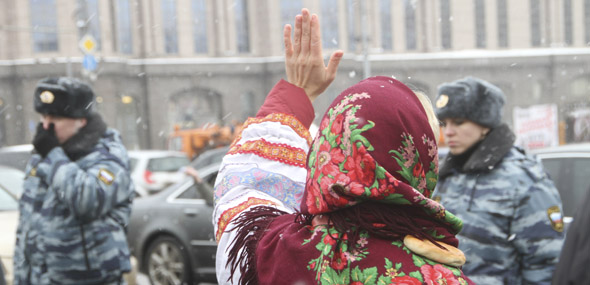THE HUMAN FACTOR
Solving the political, cultural, economic dimensions of global issues
Interview with Susan Silbey
Insights from anthropology and sociology on global environmental issues

"Transferring the models of physical matter or rational calculation to these massive global problems can do a great deal to help solve our current issues — but only when they are informed by a nuanced understanding of how humans and human organizations operate."
— Susan Silbey, Leon and Anne Goldberg Professor of Humanities, Sociology and Anthropology; Professor of Behavioral and Policy Sciences
About the Human Factor series
MIT is working to advance solutions to major issues in energy, education, the environment, and health. For example: How can we reduce morbidity and mortality in cancer cases? How can we halve carbon output by 2050? How can we provide quality education to all people who wish to learn?
Framing the questions — As the editors of the journal Nature have said, framing such questions effectively — incorporating all factors that influence the issue — is a key to generating successful solutions. Science and technology are essential tools for innovation, and to reap their full potential, we also need to articulate and solve the many aspects of today’s global issues that are rooted in the political, cultural, and economic realities of the human world.
Sociotechnical collaboration — With that mission in mind, MIT's School of Humanities, Arts, and Social Sciences has launched The Human Factor — a series of stories and interviews that highlight research and perspectives on the human dimensions of global challenges. Contributors to this series describe research that generates social innovation, and share ideas for cultivating the sociotechnical collaborations that are needed to solve the major civilizational issues of our time.
___________
SUSAN S. SILBEY is the Leon and Anne Goldberg Professor of Humanities, Sociology and Anthropology in MIT-SHASS, and a professor of behavioral and policy sciences in the MIT Sloan School of Management. Her expertise is drawn from work in governance, regulatory, and audit processes — including management systems for containing risks, including ethical lapses — and research on how health and safety regulations are put into practice. She co-teaches a required course on energy decisions, markets, and policies. Silbey was the moderator of a 2015 SOLVE conversation focused on the question “What Is Human?” MIT-SHASS Communications asked her to share her thoughts on solving the world’s energy needs.
Q: MIT President L. Rafael Reif has said that solving the great challenges of our time will require multidisciplinary problem-solving — bringing together expertise and ideas from the sciences, technology, the social sciences, arts, and humanities. Can you share how the tools and perspectives from anthropology and sociology help address the world’s energy needs?
Silbey: To solve the world's energy issues, we need to move off carbon-based fuels; we also need to reduce our energy consumption overall. We can think about this as a technological problem, but that will not solve the fundamental issues. Clearly, energy demands are socially generated.
Importantly, energy sources are also accessed and managed through human organizations, which make decisions about where to source fuels as well as what kinds of fuel sources to invest in. Those are political and economic questions, not geological nor chemical.
The chemistry and physics are about the efficiency of different sources of fuels; the geology about the locations of raw materials; the biology about alternatives. Our chemistry and physics expertise become relevant when some group of persons decides to extract or produce the materials and distribute them. Understanding this dynamic is step one.
Step two: Distribution needs a network or infrastructure. Where does that come from? From earlier and contemporary political, governmental, and economic decisions. The most obvious example is the American reliance on the automobile rather than public transportation. We, as a nation, with massive public funding, as well as some private, invested in roads and slowly withdrew investment in railroads. As a nation, public funds were also invested in subsidies for the rubber industry for tires.
Recognize that human beings, not technology per se, make decisions about our world
The resulting transportation network is not a consequence of the invention of the train or the automobile, technology per se. Rather, human actors — through organizations and governments and educational systems — decided to fund, maintain (or not to maintain) tracks and roads, creating the elaborate infrastructure which constrains our ability to respond to the current global crisis. Issues of preference, taste, and habit are considerably more malleable than are these infrastructures.
In the United States in 2015, we are tied like an umbilical cord to the automobile, and we also find ourselves without a functioning legislature, hampered by anti-government anti-tax ideologies unable to coordinate responses to our climate crisis. Even if we could marshal collective action, the most efficient solution, sadly, is locating the innovative infrastructure in places on the globe where histories of energy-consuming infrastructure do not yet constrain to the degree nor cost as much as they would in the United States.
These are not issues that technological innovation, for all its power and promise, can address, unless by innovation we include reorganization of the American electorate and concentrated ownership of the mass media. So, I would propose that at future SOLVE sessions, and for the ongoing MIT initiatives, we look at a central problem for collaborative problem-solving:
How do we sustain democracy and representative government in a globalized, digital world with vastly unequal participants? Working together, technologists and social scientists could make real advances on this and other major questions.

campaigning for the protection of fair elections
"I would propose that we add a central question for collaborative problem-solving: How do we sustain democracy and representative government in a globalized, digital world with vastly unequal participants? Working together, technologists and social scientists could make real advances on this and other major questions."
Q: What do sociology and anthropology teach us that might help address these issues?
Silbey: These fields teach us to look at the ways our actions are interdependent, layered with multiple, often ambiguous meanings, subject to the unequal power of various actors and organizations. Those meanings are created, enacted, and circulated through the activities of every actor in daily transactions. We use the term culture to refer to a system (linked networks) of symbols (signs, words, actions) and the meanings (communicated content) attached to and emerging from the ways in which people speak and act. This conception of culture recognizes that what people communicate and what they do are inseparable, and often unthinking, habitual, taken-for-granted.
The network of signals and meanings has no existence independent of the activities of people that instantiate, reproduce, and transform that system, network, or as anthropologists and sociologists call it — culture.
Finally, what sociology and anthropology also teach us is that organizations are not actors. Organizations are patterned networks of multiple humans with distinct roles, distributed authority and varied expertise — that is, both a single collectivity and many individuals embedded in an even larger network of transactions (system of signs, i.e. culture). Those transactions are moments of cultural reproduction or cultural transformation, invoking conventional signs and meanings or altering them. Every alteration will not necessarily refashion the system of signs. But some will. And here is where power, authority, and institutional resources make all the difference in cultural processes and social change.
Q: Can you comment on barriers to multidisciplinary problem-solving, and what might resolve them?
The MIT SOLVE endeavor can help us address the challenges already identified — if we put the conditions and coordination of human action at the center of each problem. Through SOLVE and other initiatives, MIT has a golden opportunity to demonstrate that collaboration among experts from various disciplines can accelerate successful problem-solving for the great global challenges.
One element of such collaboration is to engage social science and humanities expertise early on, because both fields have lead roles in an initial, difficult, and orienting task, namely: defining the problems accurately, fully characterizing their causes, dimensions and attributes. The social sciences and the humanities also have much to contribute to imagination, design, and assessment of potential solutions.

"One element of a successful collaboration on these issues is to engage social science and humanities expertise early on; both fields have lead roles in an initial task: defining the problems accurately — fully characterizing their causes, dimensions, and attributes."
—Susan Silbey, Goldberg Professor of Humanities, Sociology, and Anthropology
Q: MIT SOLVE asked four questions related to energy. What additional questions do you think need to be articulated to make progress toward MIT’s global energy goals? In particular, what economic, socio-political, and/or cultural issues do you think need to be addressed?
Silbey: We need to mobilize more accurate and less ideological conceptions of law and public regulation, if we are to develop useful strategies and tools with which to address these problems.
Two questions I’d recommend adding to our collective problem-solving agenda at MIT are: How shall we manage climate change? and How shall we shift away from carbon-based fuels?
I often hear the "command and control" mode juxtaposed to the market as a mechanism for new policies. ["Command and control" is a phrase used to describe a "system empowering designated personnel to exercise lawful authority and direction over assigned forces for the accomplishment of missions and tasks."] The market appeals to many because it is described as a space of relative freedom and can be both described and explained (to some extent) with numbers, which are believed to be unambiguous measures of the world, rather than forces that in fact format social action.
However, when people juxtapose the market to command and control, they are caricaturing structures of governance and regulation, implying perhaps tacitly that law operates with tight military-like discipline, which is the most common association of the phrase “command and control.” Yet, surely, we know that neither law nor most public policies and regulations truly operate with the directness that is captured by the phrase “command and control,” which characterizes the non-negotiable command structure of the military or the police.
Perhaps the opposition between the market and command and control is actually about efficiency, that is, comparing these alternative coordinating processes in terms of the capacity to achieve efficient outcomes. If this is so, then it is worth mentioning that in our Jeffersonian Dinner conversation about what makes us human, I did not hear anyone mention a desire or appreciation for efficiency as a central human characteristic. Yet, it is routinely invoked as the criteria of evaluation for one or another course of action or public policy.
Factor in knowledge of how change really occurs in human societies
Our government and most democratic republics do not in fact work by command and control, and certainly they are not efficient organizations. But, that is not their aspiration; perhaps as we discuss how to solve the world’s great problems, we need to consider alternative goals and criteria. Law places little value on efficiency. In fact, law has no efficacy without elaborated recipes, including defenses, rebuttals, appeals, and, most of the time, extended negotiations.
Participants in conversations such as those at SOLVE could benefit by thinking about solutions that include alternative values to efficiency and more realistic paths and tools — for example thinking about law as a system of orchestrated conversations where the rules of engagement have been written over centuries.
We should understand that law (and its progeny of public regulation) is not in itself an alternative to the market but is a collaborator that helps to make markets work. If the free market is repeatedly juxtaposed to command and control, we will not develop solutions to problems because coordination requires human orchestration, and the market has limited variation in its mechanisms for that orchestration.
While useful in many ways, the market needs to be bounded and limited lest we erase any notions of ethical life. Everything cannot be a commodity for exchange without limits. If markets are the only alternative to command and control, humans will truly have become things.

"We need to mobilize more accurate, less ideological conceptions of law and public regulation, if we are to develop useful strategies and tools with which to address these problems. Two questions I’d recommend adding to our collective problem-solving agenda at MIT are: How shall we manage climate change? and How shall we shift away from carbon-based fuels?"
— Susan Silbey, Goldberg Professor of Humanities, Sociology and Anthropology
Consider what makes us human
Q: You were the moderator for SOLVE’s Jeffersonian Dinner discussion on “What Is Human?” What ideas emerged from this discussion that you think need to be considered as MIT works toward solving global issues in education, health, innovation, and the environment?
Silbey: Among the participants in the dinner discussion of “what makes us human,” there was near unanimity that what makes us human is not and will not be captured by technology. Although each speaker offered variations on this theme, almost everyone spoke not only to the presence but the positive importance of human passion, empathy, and the desire to be and do good.
In the discussion, there was a sense that our consciousness and awareness of the fragility and temporal limit of human life is what makes us human. As one of the participants said, “We are human because we die and unlike animals are aware of that” and “because we have the ability to be aware of our awareness, we have the ability to make choices about the kinds of people we will be in the very short lives we have to live.”
Another thoughtful participant spoke about the displacement of opportunities for meaningful work as a core of our lives (citing the Uber takeover from union taxi drivers as just the beginning of the process of making humans obsolete from commercial enterprise). The lack of these opportunities, it was argued, might have a more powerful effect on diminishing the valued aspects of human life than other possible technological advances (such as modifications of the human genome).
After all, most people spend most of their days working. Technology has expanded isolated work: online at home, consulting, temporary jobs, contingent labor. Importantly, interaction and socializing at places of work is a major part of human life, not only the exchange and cooperation that happens through work, but also the emotional as well as cognitive relationships. Moreover, for cultures in which one’s job is a central part of status, the loss of meaningful and socially engaged work is substantial.
Some members suggested that if humans are characterized by aspirations to be and do good, clearly we are not doing so well in our aspirations or efforts to do good. What would happen, some asked, if we just tried a little harder and were a little kinder, would not the world be a lot better? There was a sense of optimism among many of the participants, which I confess not to share.
Recognize that human values derive from social relations
What was missing from the conversation was a sharper sense that human capacities — including consciousness, empathy, and emotion — derived from and were embedded in social relations. That to be kinder, more empathetic, more self-conscious of our life on this globe demands that we recognize that we are interdependent — not individual minds or independent actors. Social organization and experiences embedded within and derived from social conditions shape what actors desire, value, and are capable of achieving and being.
To a great extent the conversation revisited some by-now familiar assumptions about technological innovation that are often a source of some of the unintended social consequences of technology. Importantly, one could read in the conversation a yearning for something that I hope will be much more present as the MIT SOLVE endeavor evolves: the fundamental understanding that though science and technologies are invaluable tools, they cannot alone solve the problems we face.
Draw on additional forms of knowledge and explanation
There seemed to be a consensus, tacit perhaps, that we need other forms of knowledge and explanation to help us address global problems. Because human action and social relations shape how we use, or misuse, scientific knowledge and technological inventions, it seems that we need to understand how human action is patterned, organized, and coordinated in ways not explained by physical forces or individual human intention or will.
Transferring the models of physical matter or rational calculation to these massive global problems can do a great deal to help solve our current issues — but only when they are informed by a more nuanced understanding of how humans and human organizations operate.
Interview prepared by SHASS Communications
Human Factor Series Editor: Emily Hiestand, Communications Director
Series Writing Team: Emily Hiestand, Kathryn O'Neill
Published 9 November 2015